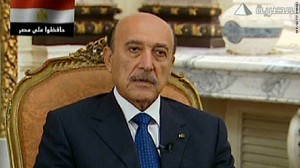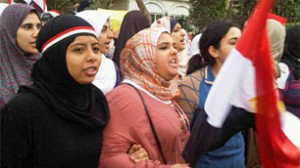
Egypt’s recently appointed vice-president agreed to several concessions in direct talks with opposition groups on Sunday, including allowing press freedoms and lifting the country’s emergency laws once security is stabilized.
Vice-President Omar Suleiman’s meeting with Egypt’s largest opposition group, the Muslim Brotherhood, and other opposition organizations was aimed ending the country’s political crisis on the 13th day of demonstrations against President Hosni Mubarak’s regime.
Other delegates attending the discussions include members of secular opposition parties, independent legal experts, a representative of opposition figure Mohamed ElBaradei and business tycoon Naguib Sawiris, according to Reuters.
The officially banned organization said in a statement early Sunday it would meet with Suleiman to press its “legitimate and just demands.”
The negotiations marked the first time the Muslim Brotherhood has held direct talks with the government. In the past, Egyptian officials have accused the group of trying to overthrow the secular order.
Senior Brotherhood leader Mohammed Mursi said his representatives would be sticking to the protesters’ main condition that Mubarak step down after nearly 30 years of authoritarian rule.
Senior government figures argue only that the president has the power to make the changes necessary to enable a free and fair election for his successor.
Mubarak has said he would not run for the presidency again in elections slated for September, but has insisted he will serve out the remaining seven months of his current term to supervise a peaceful transfer of power.
Countries such as Israel and the United States have been worried that the anti-government protests would end with an Islamist government eventually running the country.
Muslim Brotherhood spokesman Assam el-Aryan said his party won’t contest the next election, but it will help with the transition of power.
“We are ready for any duty, any burden that can be given to us as a task for the future of our country,” he said.
On Saturday, Hossam Badrawi — who is known as a reformer — replaced Safwat El Sherif, who resigned as general secretary of the ruling National Democratic Party. At the same time the president’s son, Gamal Mubarak, stepped down as head of the party’s policies committee.
Doctors, medical supplies enter protest square

Anti-government demonstrators, meanwhile, are continuing to occupy Cairo’s Tahrir Square, including several women.
As thousands of chanting protesters gathered in the square on Sunday, doctors in white coats came with medical supplies, the CBC’s David Common reported from the scene.
Protesters have been camped out in the square for a week, but supplies have been flowing in for the past two days.
Meanwhile, garbage trucks were making the rounds again and banks near the square were able to reopen on Sunday.
People have been clamouring to get into the the banks amid reports that automated tellers have been running out of money.
Overnight, the army set up check points farther away from the square in central Cairo. David Common said he saw the army confiscating food and other supplies and he heard they were turning away cars but letting pro-government supporters through.
The UN estimates at least 300 people have been killed and thousands more wounded in the unrest.
Earlier Saturday, army commander Hassan al-Roweny made a direct plea for protesters to leave the central square in Cairo. The crowd shouted him down when he told them they were hurting the country, and he soon stepped down from the podium, saying he would not continue talk over their chants.

Leave a Reply
You must be logged in to post a comment.